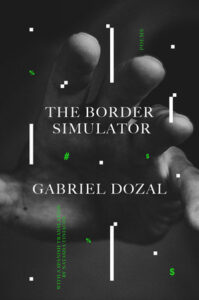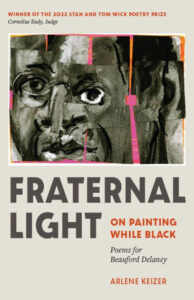Who's at work in American poems? I take note when I find anyone working a contemporary job in a contemporary poem. In this month's poetry roundup, we get to slip behind the information desk at The Metropolitan Museum of Art, inhabit the vantage of a model pretending to pump gas, and observe a duet of two men fixing a frozen escalator. Labor–the means or impediment to making creative work: we follow Beauford Delaney to France to paint in Arlene Keizer's Fraternal Light, which has, as an epigraph, an excerpt from his application for funding, "I wish to be able to work one year free from immediate financial worries, in a quiet place, with the possibility of some travel in Europe." At work, the mind of the poem wanders. Are we living in a simulation? What does it mean to be part of the history of life on earth, linked to the lives of frozen creatures- wolf, bird, lemmings– of the Ice Age? As I pour over this small stack of August books, I return to David Keplinger's "Sonnet": "Praise the singing bowl after the song. / Praise who cast, from such delicate / bronze, an absence."

Gabriel Dozal, The Border Simulator / El Simulador de Fronteras, trans. Natasha Tiniacos
(One World)
"You're so close to being over the border, just get over it already," quips the speaker in Texas poet Gabriel Dozal's debut, El Simulador de Fronteras, which pairs his poems in English with Spanish translations by Natasha Tiniacos. We witness "the crosser," who "is a possession that someone wants but we're not sure who . . . . " In interrogations of the border as simulacra, we follow a pair of siblings, Primitivo and Primitiva, in a sobering and imaginative deconstruction of a political concept that costs innumerable lives. Repetition, pointed tautologies, and other linguistic plays and ploys prevail, and succeed: Primitivo "went into the casket alive,/ crossed the border, / and came out something like alive." Meanwhile, "The fence isn't real, it's extra real / because we get crossers to also swallow/ all of it, the whole simulator." As Primitovo asks, "That's a job? Defining borders?"

Arlene Keizer, Fraternal Light: On Painting While Black Poems for Beauford Delaney
(Kent State University Press)
There is a line in Arlene Keizer's richly-researched debut collection about "all the unsung flowers." Part lyric biography, part celebratory contribution to the limited field of ekphrastic poetry books responding to African American artists, Keizer's collection unfolds a myth-making presence for Tennessee-born painter Beauford Delaney and his "fractal language." Moving between persona and observation, these poems track the artist from an awakening to gay desire in the garden of the Isabella Stewart Gardner Museum– "Is he playing with / my gaze or stalking desire?"– to Greenwich Village, where "you're painting syncopation, the deep cadence of black life," to his emigration to France where his "glory may sing" as a Black artist. Keizer also provides Delaney with a champion beyond the everyday limitations of this world through an imaginative version of the Caribbean figure Papa Bois "queer—quixotic and multiloving": "Papa Bois, old woodsman, come see/ how this golden son paints your domain— sycamore's plainsong, pine's keen sigh."

David Keplinger, Ice
(Milkweed)
"Let us see how specialness / survives past death," begins a poem on the discovery of an Ice Age lemming. Keplinger's Ice travels across time and space, both evoking the history of life on earth and focusing on personal losses, as in a portrait of a dying mother reading Dickinson– "My mother coughed again. / Little dashes in her sentences." There is an arresting intimacy to the icy breadth of this collection, a sense of something unvisited before, whether we're watching two men solve the problem of a frozen escalator – "They say nothing / to each other. They/ stare down at the work / of making things / work" – or, back to the lemming, reflecting on one of many finds surfacing due to climate change – "Like at the exhumation / of the murderer or the saint, / some skin has yet to be dissolved." Keplinger conjurs a world where even in "the winters of childhood" solace is found in books, or right here, in these lyrics, finely built.

Edgar Kunz, Fixer
(Harper Collins)
Fixer offers direct presence through its common present tense and immediate imagery, and recounts via a certain cool–both sides of the word– reminiscent of a vein of contemporary American fiction, as Kunz takes us into unexpected corners of the world of work, whether it is a tester testing chip dips or model performing work for work: "In a peacoat and slacks I pretend / to pump premium into a rented Benz." At the heart of the book is the long title poem, where the stakes rise, painfully, as the speaker and a brother crawl through the window of their estranged dead father, "Handy," a handyman and addict, and sort through a life to reconstruct it. The style of sparse reportage turns to an autopsy report and to the manifestations of complicated grief, as later the speaker, contemplating the need for a therapist "smarter than me" wonders, "How old would you be now? / I do the math and come up/ with a number so low/ I check again. Nothing / changes . . . . "

Sally Wen Mao, The Kingdom of Surfaces
(Graywolf)
"Say it. Say it to my face," begins "Batshit," a seamless rush of a poem confronting violence against Asian Americans in Sally Wen Mao's unflinching The Kingdom of Surfaces. This poem is preceded by an opening poem about white fragility, a concrete poem shaped like a porcelain vase. If you are a reader of Wen Mao's earlier work, you won't be disappointed; she continues to harness ornately textural imagery to expansive ends, whether it is a "fat white worm" rescued by an Empress from her teacup "its mouth a gutter, / a hole, a maw so consumed by consumption…." in juxtaposition with a "a vat of dye for the white to soak in, / a factory of full of girls" or Barnum's "heavenly hoax: a mummified half monkey, half fish, / ribs knotted like ropes around a sinking mast." "I'm sick of speaking for women who've died," the speaker of "Aubade in Gravel and Gold," begins, later concluding, "They sailed, they sailed through me / and I turned gold with that touch."

Robyn Schiff, Information Desk: An Epic
(Penguin Poets)
Have you ever wanted to be on the other side of the desk, or the doors, in the museum? Robyn Schiff's engrossing epic journeys us behind the scenes at the Metropolitan Museum, and into the mundane workday. Here we are privy to the speaker's mind at work on art, personal memories, and the edges of a poem's world (and making), twisting and turning over staggering sextets. Meet the visitors: John F. Kennedy Jr. asking the time; museum-goers asking "Where / are the dinosaurs?" Encounter special exhibits (Rembrandt / Not Rembrandt) and unexpected artifacts such as an undisplayed lice comb– "[t]he opposite / of a Fabergé egg." The lines between work and art dissolve through memory and creation; when the speaker's husband tells her he "believes we are living in a computer simulation," she responds, "I live in my poems."

Ida Vitale, Time Without Keys: Selected Poems
(New Directions)
"What can be more private, more secret, than the moment when a verse arises?" Uruguayan poet Ida Vitale asks. On the eve of her one hundredth birthday, New Directions brings us a selected volume, Time Without Keys, translated by Sarah Pollack. The final poem is an arresting single poem from Vitale's 1949 debut, a poem of transformation– "What this sea / this swollen shadow / loses little by little / comes to be saved within me" – while the collection opens with poems from a recent 2021 collection. Throughout, we taste Vitale's elemental attention, turned to the snail, the bird, the word itself. Or in "Meadow for Orpheus": "Music, a wing, touches our skin. / Thereafter we are fields of truth." Selections from 75 years of celebrated lyric imagination, include the gem "Closure," with the line, "I go walking/ one day toward the wonder I don't believe in."
No comments:
Post a Comment